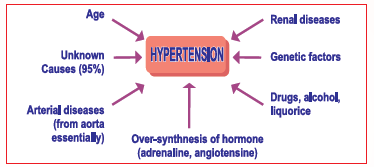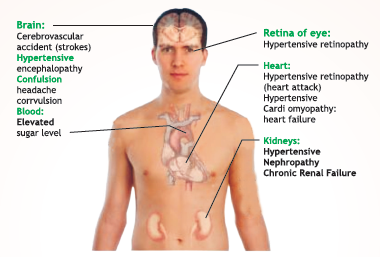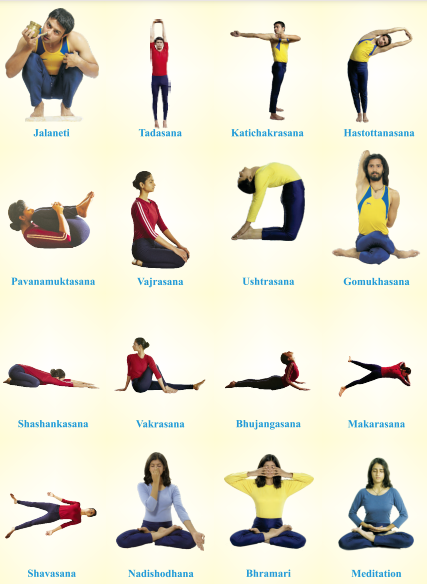Yogic Management of Hypertension
Yogic Management of Hypertension
Hypertension, also referred to as high blood pressure, is a condition in which the arteries have continous elevated blood pressure. Blood pressure is the force of blood exerted against the blood vessel walls. Every time the human heart beats, it pumps blood to the whole body through the arteries. The higher the pressure the harder the heart has to pump.
Hypertension can lead to damaged organs, as well as several illnesses, such as renal failure (kidney failure), heart failure, stroke or heart attack. High blood pressure during middle age may raise the risk of cognitive decline in the later part of life.
The normal level for blood pressure is below 120/80 mmHg, where 120 represents the systolic measurement (peak pressure in the arteries) and 80 represents the diastolic measurement (minimum pressure in the arteries). Blood pressure between 120/80 mmHg and 139/89 mmHg is called pre- hypertension (to denote increased risk of hypertension), and a blood pressure of 140/90 mmHg or above is considered hyprtension.
Symptoms
High blood pressure (hypertension) usually has no obvious symptoms and many people have it without knowing. Untreated high blood pressure can lead to serious diseases, including stroke and heart disease.
- Persistent headache
- Blurred or double vision
- Nose bleeds
- Shortness of breath
Hypertension may be classified as essential or secondary. Essential hypertension is the term for high blood pressure with unknown cause. It accounts for about 95% of cases. Secondary hypertension is the term for high blood pressure with a known direct cause, such as kidney disease, tumors, or birth control pills.
Classification of Hypertension
Primary Hypertension : (high blood pressure in the absence of any underlying disease)
- Benign Hypertension
- Malignant Hypertension
Secondary Hypertension (elevated blood pressure due to some underlying disease)
- Cardiovascular Hypertension
- Endocrine Hypertension
- Renal Hypertension
- Neurogenic Hypertension
- Pregnancy induced Hypertension
Cause & Risk factors :

In over 90% of cases, the cause of high blood pressure (hypertension) is unknown but several factors can increase the risk of developing the condition. Factors that can raise the risk of developing primary high blood pressure include:
- Age : The risk of developing high blood pressure increases as the person get older.
- Family history : Children born to hypertensive parents are at high risk of developing hypertension than those born to non-hypertensive one. A shared environment in the family like diet, exercise, smoking habits etc. may have its implications for development of Hypertension.
- Obesity : Higher the weight, greater the risk of development of Hypertension.
- Excess salt intake : Salt contains sodium, which retains the fluid in the body that raises the blood pressure.
- Diet : A diet rich in saturated fatty acids and poor in vitamins and fibres increases the risk of Hypertension.
- Addiction : Alcohol consumption and cigarette smoking both are linked with increase in blood pressure.
- Physical inactivity : People who are inactive are tend to have higher heart rate. The higher the heart rate the harder the heart must work with each contraction putting a stronger force on the arteries. Lack of exercise also increases the risk of being over weight.
- Mental stress : Stress leads to increased secretion of catecholamine in the body, which increases the blood pressure. If the stress factor is not tackled, BP remains elevated chronically.
 Common causes of secondary high blood pressure include :
Common causes of secondary high blood pressure include :
- Kidney disease
- Diabetes
- Narrowing of the arteries (large blood vessels) supplying the kidneys Hormonal conditions, such as Cushing's syndrom (a condition where body produces an excess of steroid hormones)
- Conditions that affect the body's tissue, such as lupus
- Oral contraceptive pill
- Pain killers known as non-steroidal anti-inflammatory drugs (NSAIDs), such as ibuprofen
- Recreational drugs, such as cocaine, amphetamines and crystal methamphetamine
- Herbal remedies, such as herbal supplements
Complications of Persistent High Blood Pressure

Management of Hypertension
Dietary Management
- Maintain healthy lifestyle by maintaining adequate nutrition.
- Regularize eating habits by taking food at regular intervals.
- Avoid fried foods and cold drinks.
- Sprinkle lemon juice over vegetables instead of table salt.
- Take foods rich in fibres like vegetables and fruits - Apple, Orange, Carrot, Tomato, Beans etc.
- Do not skip a meal.
- Avoid pickles, chutneys, pappads, salted nuts, chips etc. which contain lot of salt.
- Eat foods rich in antioxidants like Citrus fruits, Papaya, Tomatoes, Grains, Cereals, Potatoes, Green leafy vegetables.
- Avoid baked dishes, which have baking power.
Yogic Management
The role of Yoga in the management of Hypertension is well documented now. Aim of the treatment in Hypertension should be to lower the blood pressure and to prevent from further complications arising out of Hypertension. The practices for the management of Hypertension are as under :
- Kriyas : Jalneti, Sutraneti
- Yogasanas : Tadasana, Katichakrasana, Urdhwa Hastottanasana Pawanamuktasana, Vajrasana, Ushtrasana, Gomukhasana, Shashankasana, Vakrasana, Bhujangasana, Makarasana, Shavasana.
- Pranayama : Nadishodhana, Ujjayi, Sitali and Bhramari.
- Meditation : Breath awareness, Om chanting and Om meditation.
- Special Note : The head stand (topsy-turvy) postures and hyperventilation breathing practices should be avoided. Concentrate more on pranayama and meditation than the other practices.
Living with High Blood Pressure
- Maintain a healthy weight.
- Regular exercise/Yoga is compulsory
- Avoid using too much sodium/salt.
- Get adequate potassium, calcium and magnesium in diet.
- Add fiber to the diet.
- Stop alcohol and smoking.
- Use anti-inflammatory medications wisely.
- Learn to check the blood pressure at home.
- Reduce stress.
Yogic Practices for the Management of Hypertension

Last Modified : 8/24/2024
Provides information about Do’s and Don’ts of Yoga...
This topic contains the information related to Mul...
Provides information about World Hypertension Day ...
This topic provides information about Malaria (Vis...
